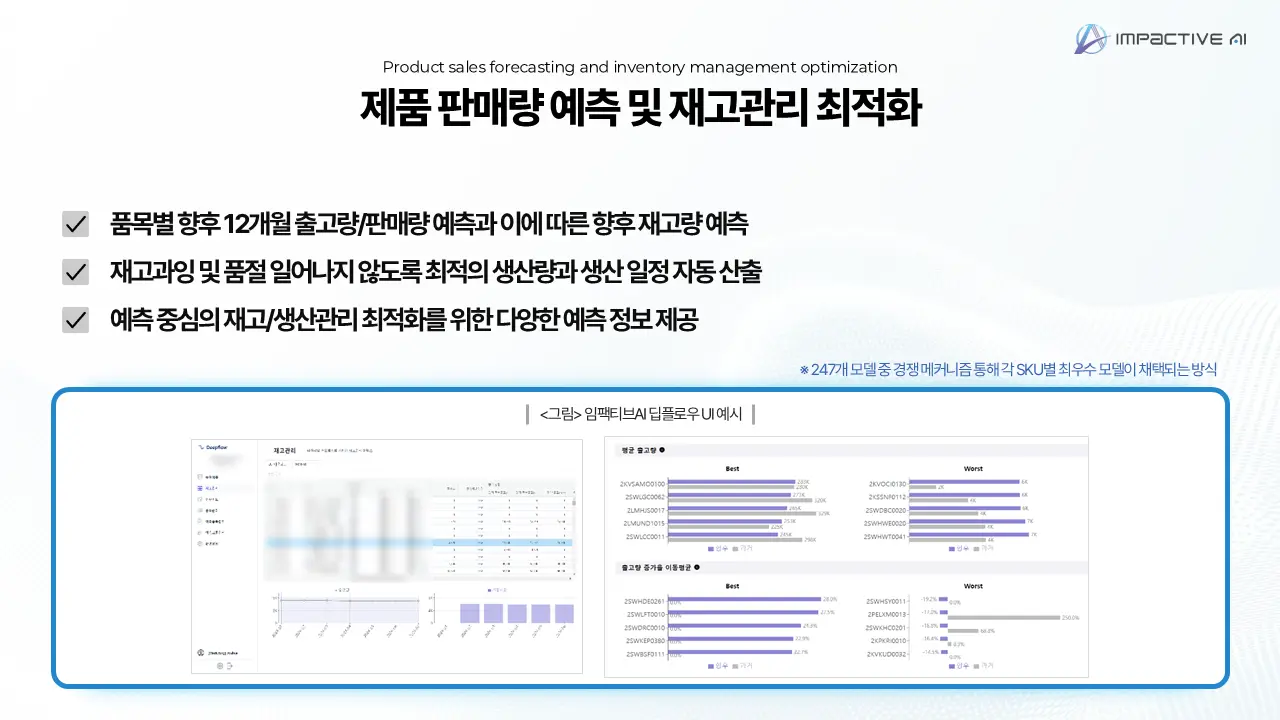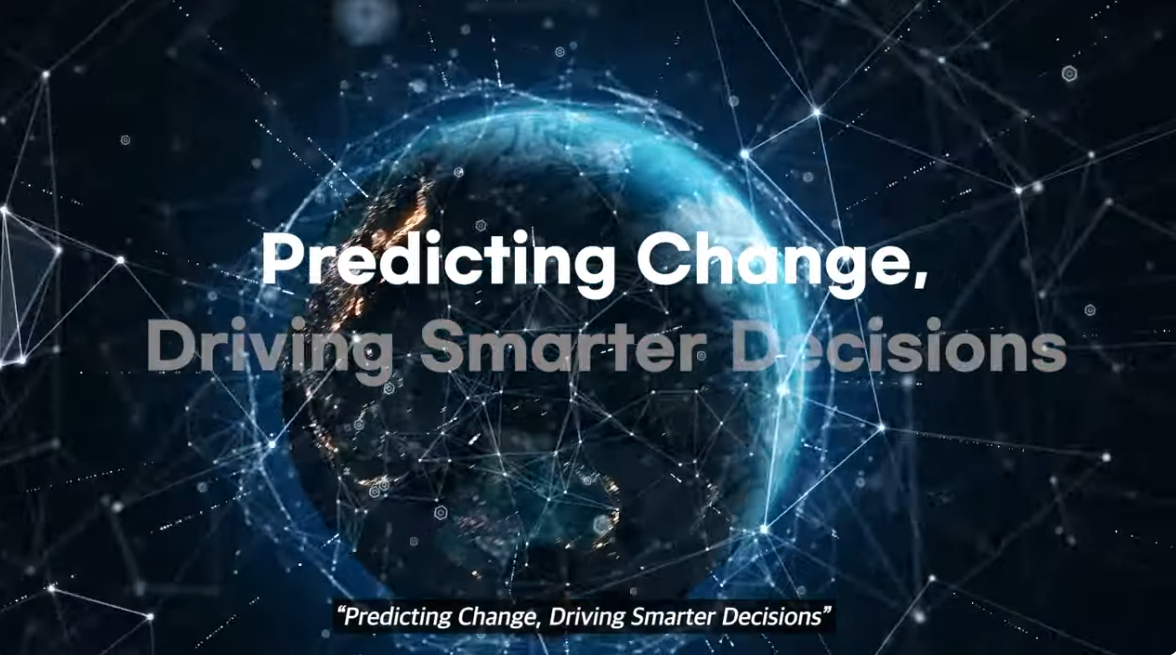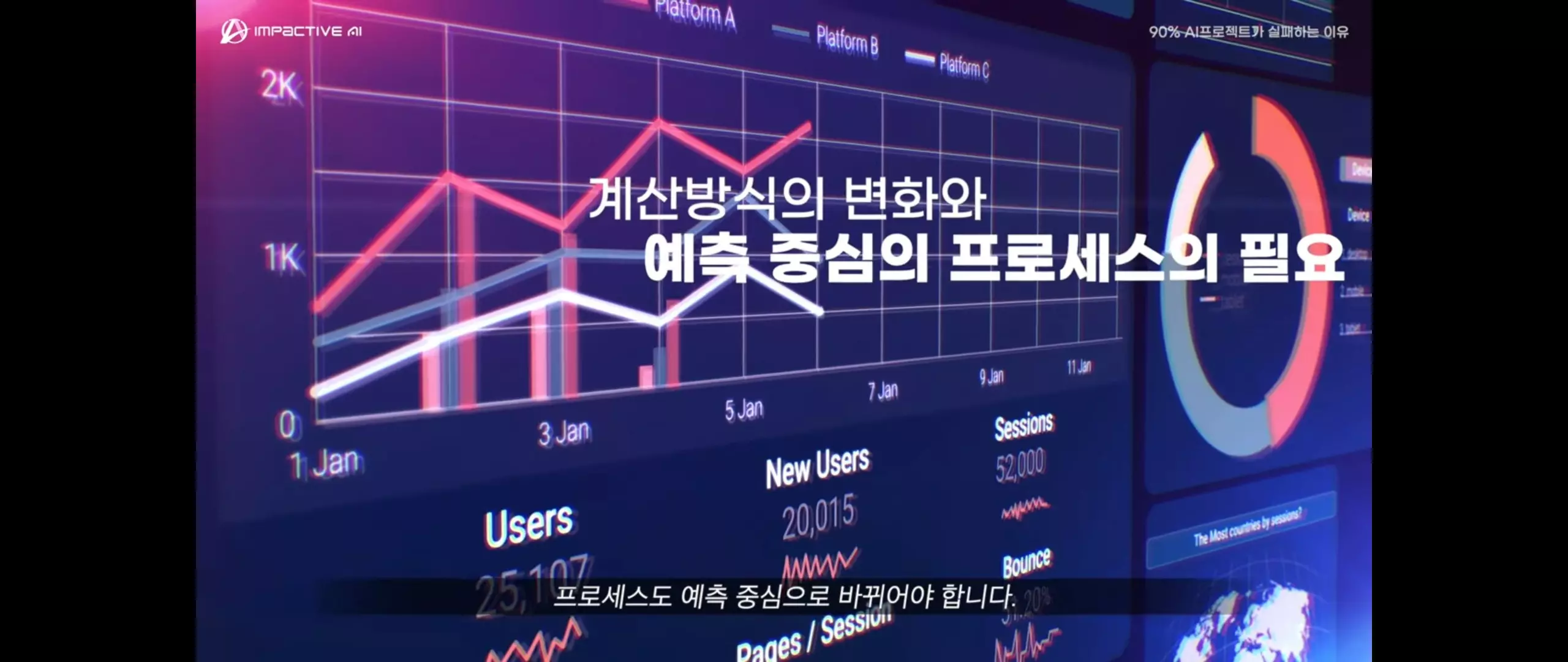Retail AI: Why Demand Forecasting Systems Must Be Adopted

Recently, the retail industry is facing unprecedented challenges as the boundaries between online and offline channels blur amid unpredictable market changes, while personalized consumption trends strengthen. In this situation, artificial intelligence (AI) is leading innovation in the retail industry as a powerful tool that quickly and accurately analyzes vast amounts of data and predicts future demand.
Artificial intelligence (AI) is leading innovation in the retail industry as a powerful tool that quickly and accurately analyzes vast amounts of data and predicts future demand. If you want to learn more about what exactly this AI technology is, please refer to the article "What are Predictive AI Models? - Definition, Principles, Application Cases, Advantages and Limitations, Trends."
Many leading companies are already introducing AI to achieve practical results such as inventory management optimization, operational cost reduction, and customer satisfaction improvement, establishing this as an essential trend for corporate survival and growth rather than a simple technological choice.
This article provides in-depth analysis of why demand forecasting AI adoption is essential for continuous growth and competitiveness of companies in the rapidly changing retail environment. Decision-makers and IT personnel at retail companies will be able to clearly recognize the importance of AI-based demand forecasting through this article and confirm that its accuracy and efficiency can bring innovative changes to your company's inventory management and operational strategies.
Retail AI Era: Beyond Prediction Uncertainty to New Opportunities
The Vicious Cycle of Prediction Failures Holds Back Retail Companies

Today's retail companies face a more unpredictable business environment than ever before. Consumer trends are changing rapidly, the frequency of unexpected external variables is increasing, and complex interactions between online and offline channels are neutralizing traditional prediction methods.
In reality, many retail companies are experiencing vicious cycles where they suffer losses from excess inventory due to inaccurate demand forecasting, or conversely, fail to properly respond to demand surges, experiencing stockouts and causing customer complaints.
To learn more about why accurate demand forecasting is difficult without AI adoption and its consequences, please refer to the article "Why Demand Forecasting AI Implementation Fails."
AI-Based Demand Forecasting: Opening the Future with Accurate Data
Artificial intelligence (AI) is emerging as the key driving force to overcome these prediction difficulties and create new opportunities.
AI analyzes and learns not only vast amounts of past sales data but also various external data such as weather, promotions, social media trends, and macroeconomic indicators in real-time, discovering patterns and correlations that were difficult to capture with human intuition.
According to NVIDIA's 2025 report, 89% of the retail industry has already adopted or is considering adopting AI, and 87% of AI-adopting companies experienced annual revenue increase effects. This suggests that AI-based demand forecasting is no longer a distant future technology but a core strategy that creates realistic results.
AI Adoption Still in Early Stages... First-Mover Companies Lead the Future
Of course, AI adoption in the retail industry is still in its early stages. According to the Ministry of SMEs and Startups' 2024 Smart Manufacturing Innovation Survey, the manufacturing AI adoption rate among small and medium enterprises that introduced smart factories is only 0.1%. This means AI adoption is concentrated among some large companies or technology-leading companies, and for many companies, it remains an untapped field with great potential.
Therefore, now is an important time for retail companies to actively review and implement AI-based demand forecasting system adoption to resolve prediction uncertainty and secure competitive advantages.
Retail AI Adoption: Catching Two Birds - Cost Reduction and Customer Satisfaction
Solving Excess Inventory and Stockouts Smartly with AI
If we were to pick the biggest concern for retail companies, it would probably be excess inventory and stockout problems. Due to prediction failures, unsold inventory fills warehouses, leading to increased storage costs, deteriorated cash flow liquidity, and even disposal losses. Conversely, failing to respond timely to unexpected demand surges leads to product stockouts, causing customer inconvenience and directly resulting in brand image deterioration and sales decline.
These chronic problems have been the main culprits eroding retail companies' profitability and key factors hindering customer satisfaction.
AI-based demand forecasting systems analyze vast amounts of data to accurately predict future demand and enable maintaining optimal inventory levels, providing retail companies with efficiency and customer-centric operating environments. Smart inventory management based on data rather than intuition or experience becomes possible.

Companies that have introduced AI-based demand forecasting systems are actually experiencing significant cost reduction effects. Through accurate predictions, they can minimize unnecessary inventory securing to reduce storage costs and prevent discount sales or disposal losses. To learn more about the innovative value that actual companies gained through AI inventory management adoption, please refer to the articles "Innovative Value Brought by AI-Based Inventory Management" and "Manufacturing AI Inventory Management Implementation Success Cases."
Simultaneously, they can respond quickly to demand changes to reduce stockout occurrence rates and improve customer satisfaction by providing products customers want on time. This becomes an important foundation that goes beyond simple cost reduction effects to increase customer loyalty and establish long-term growth foundations.
Ultimately, AI-based demand forecasting can become a powerful weapon that enables retail companies to simultaneously realize two core values: cost efficiency and customer satisfaction.
Starting Personalized Services with AI-Based Predictions
AI-based demand forecasting establishes foundations for providing customer-customized services beyond inventory management efficiency. It accurately identifies individual preferences through analysis of customer purchase history, search patterns, shopping cart data, and social media activities. Based on such deep customer data analysis, retail companies can predict products that customers are likely to need in advance and effectively execute customized product recommendations, personalized promotions, and targeted marketing.
For example, if AI has learned patterns of a specific customer periodically purchasing specific products from specific brands, it can recommend those products or provide special discount benefits timed to their next purchase. Additionally, by analyzing interests of specific customer groups, new product lines can be planned, or promotions can be organized around products with high customer preference for specific events.

Thus, AI-based demand forecasting contributes to maximizing customer satisfaction and ultimately strengthening brand loyalty by providing products and services optimized for each individual customer's needs, moving away from uniform product provision methods.
AI enables providing proactive customized services through predicting customers' future purchasing behaviors and enables active customer management such as inventory shortage notifications to secure differentiated customer experiences and competitiveness.
Ultimately, AI-based demand forecasting will be the key driving force transforming retail companies from simple product sales channels to smart service providers who best understand and satisfy customer needs. To learn more about how demand forecasting technology is changing the future of inventory management, check out the article "Demand Forecasting: The Future of Inventory Management Changed by AI."
Innovation Created by Data: AI-Based Decision Making in Retail
Establishing Scientific Retail Strategies with Data, Not Experience
Until now, decision-making in the retail industry has often tended to rely on experience and intuition. While experienced managers' know-how is an important asset, there are inevitable limitations in accurately predicting rapidly changing market conditions and increasingly complex consumer behaviors. Particularly, analyzing vast amounts of data in real-time and deriving meaningful insights from it is nearly impossible with human capabilities alone.
To learn more about basic concepts and limitations of traditional inventory management methods, please refer to the articles "What is Inventory Management? - Definition, Failure Causes, Implementation Methods" and "Limitations of Excel Inventory Management and Changes Gained Through AI Implementation."
However, AI-based demand forecasting systems overcome these limitations and powerfully support retail companies in making scientific decisions based on data.
AI enhances demand forecasting accuracy by integrating and analyzing not only past sales data but also various internal and external data. Machine learning algorithms learn vast amounts of data to discover hidden patterns and correlations and predict future demand. This supports management in making core decisions such as inventory management, pricing policies, and marketing strategies based on objective data analysis results rather than relying on uncertain information.
Additionally, more effective targeted marketing strategies can be established using customer data analyzed by AI, and personalized product recommendations and promotions that increase customer satisfaction can be provided. Such data-based decision-making is an essential element for retail companies to respond agilely to market changes and secure competitive advantages.
Automating Repetitive Tasks to Focus on Core Competencies
Demand forecasting and inventory management in the retail industry are repetitive tasks requiring much time and effort. In the past, personnel had to manually analyze numerous data points and perform prediction work relying on Excel sheets.
This not only wasted time but also increased possibilities of human errors and made it difficult for personnel to focus on more strategic core tasks. However, introducing AI-based demand forecasting systems can dramatically increase work efficiency by automating such repetitive tasks.
AI automates processes of collecting and analyzing data in real-time and predicting future demand. This allows personnel to focus on higher-level decision-making based on prediction results provided by AI rather than being tied up with simple data analysis and report writing.
For example, more proactive responses become possible such as adjusting production plans according to demand fluctuations predicted by AI or proactively proceeding with additional orders when inventory shortages for specific products are expected.
When repetitive tasks are automated this way, retail companies can allocate human resources more efficiently. Personnel can focus more on strengthening core competitiveness such as improving customer experience, discovering new markets, and developing innovative business models. This becomes an important foundation for securing long-term growth momentum and building sustainable competitive advantages beyond short-term efficiency increases.
To learn more about productivity innovation through AI prediction system implementation, check out the article "Productivity Innovation Realized Through Predictive AI Solutions."
Ultimately, AI-based demand forecasting systems are core tools that support retail companies in maximizing human resource potential and focusing on core competency strengthening.
Sustainable Retail Future: Vision Presented by Retail AI
Capturing New Market Trends: AI Leading the Way
For retail companies to continuously grow in rapidly changing market environments, abilities to constantly discover new opportunities and respond agilely to changes are essential. AI-based demand forecasting plays important roles in predicting future market trends and capturing new business opportunities beyond simply analyzing past data.
Demand forecasting AI models utilize deep learning technology, particularly LSTM, to model long-term dependencies in time series data and analyze and predict complex demand patterns. LSTM excels at remembering past data and reflecting it in current predictions, making it effective for understanding demand volatility in retail markets.
Recently in the demand forecasting field, research actively progresses to enhance prediction accuracy using latest deep learning models and NLP, GNN technologies beyond LSTM. Such advancing AI technology supports retail companies in predicting dynamic changes in future markets and responding proactively rather than relying only on past data.
To learn more about methods to enhance AI prediction accuracy using time series data, please refer to the article "How to Improve AI Prediction Accuracy Through Time Series Data Augmentation."
Efficient Resource Management: Creating Sustainable Growth with AI
Sustainable growth is not just a goal for retail companies but an essential condition for survival. AI-based demand forecasting plays core roles in establishing solid foundations for sustainable growth by helping companies efficiently allocate limited resources and maximize operational efficiency.
Accurate demand forecasting is the starting point for increasing efficiency across all operational areas of retail companies including production, logistics, and marketing. Based on prediction results, optimal production plans can be established to reduce unnecessary production costs, and logistics networks can be optimized to increase delivery efficiency. Additionally, marketing budgets can be efficiently allocated according to predicted demand, and marketing effects can be maximized by providing customized promotions to target customers.
Recently, research actively applies Reinforcement Learning to demand forecasting and inventory management to implement intelligent resource management, helping determine optimal ordering timing and quantities in uncertain environments and contributing to flexible market responses and long-term profitability improvements for companies. AI-based demand forecasting is essential technology for reducing resource waste, maximizing efficiency, and achieving sustainable growth for retail companies.
Conclusion
AI-based demand forecasting has now become an essential element for survival and growth of retail companies. For retail companies facing chronic problems of prediction uncertainty, AI provides powerful solutions that enable scientific decision-making based on data, maximize operational efficiency, and improve customer satisfaction.
In this trend of the times, ImpactiveAI plays a leading role in supporting corporate value creation through AI prediction models. ImpactiveAI's Deep Flow solution implements optimization using AI throughout the entire process from product planning to sales, and provides optimal prediction models by comparing and analyzing over 100 models based on customer data.
In reality, ImpactiveAI has contributed to improving demand forecasting accuracy, streamlining inventory management, and ultimately enhancing corporate profitability across various industry sectors. Based on world-class prediction capabilities and technology, ImpactiveAI will continue to lead AI innovation across various industry sectors including the retail industry.


.svg)
%202.svg)
.svg)


.svg)
















.svg)